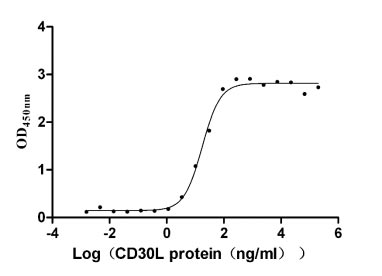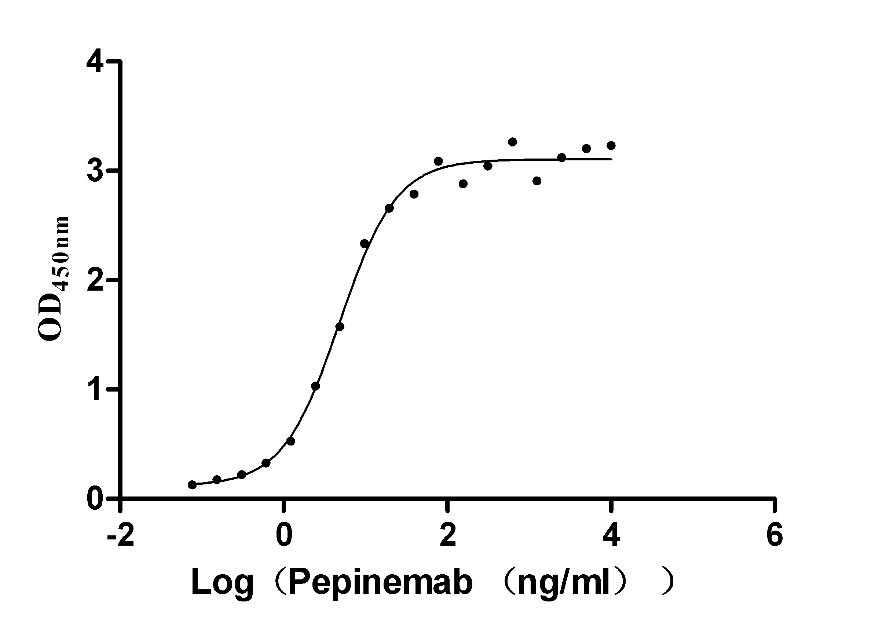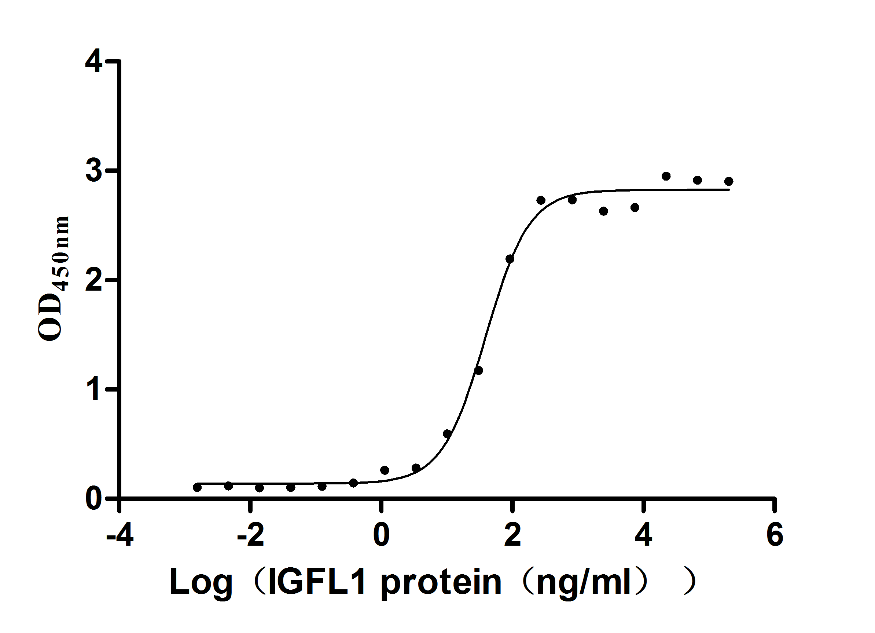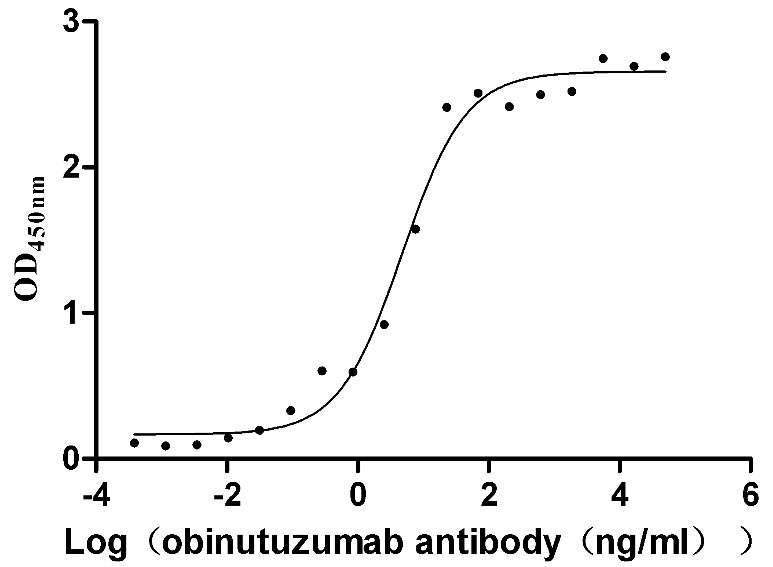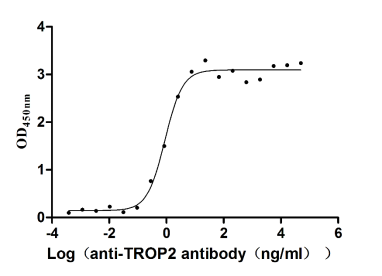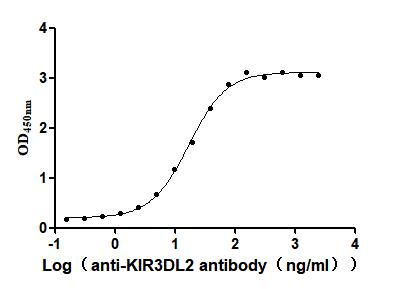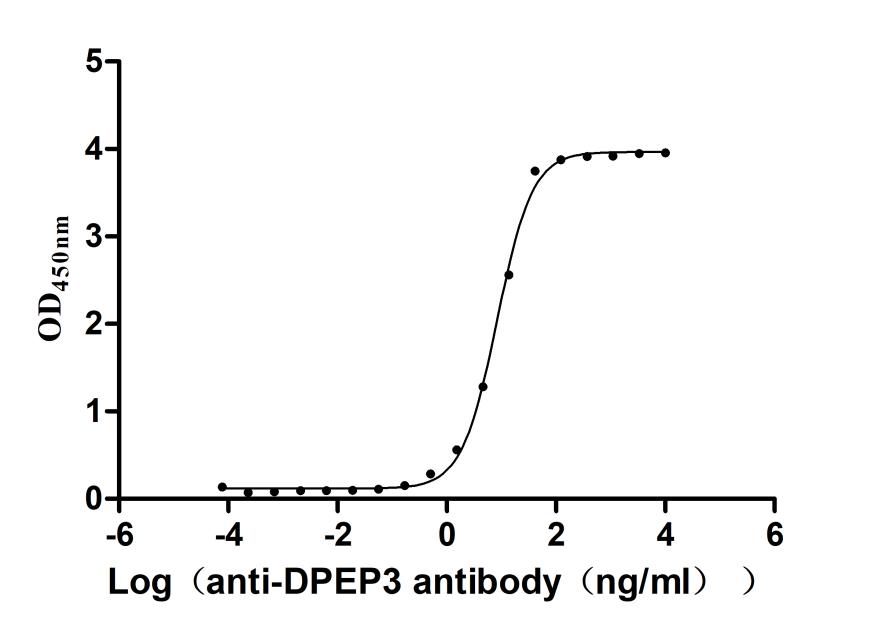Recombinant Mouse Mothers against decapentaplegic homolog 4 (Smad4)
-
货号:CSB-YP021789MO
-
规格:
-
来源:Yeast
-
其他:
-
货号:CSB-EP021789MO
-
规格:
-
来源:E.coli
-
其他:
-
货号:CSB-EP021789MO-B
-
规格:
-
来源:E.coli
-
共轭:Avi-tag Biotinylated
E. coli biotin ligase (BirA) is highly specific in covalently attaching biotin to the 15 amino acid AviTag peptide. This recombinant protein was biotinylated in vivo by AviTag-BirA technology, which method is BriA catalyzes amide linkage between the biotin and the specific lysine of the AviTag.
-
其他:
-
货号:CSB-BP021789MO
-
规格:
-
来源:Baculovirus
-
其他:
-
货号:CSB-MP021789MO
-
规格:
-
来源:Mammalian cell
-
其他:
产品详情
-
纯度:>85% (SDS-PAGE)
-
基因名:
-
Uniprot No.:
-
别名:Smad4; Dpc4; Madh4; Mothers against decapentaplegic homolog 4; MAD homolog 4; Mothers against DPP homolog 4; Deletion target in pancreatic carcinoma 4 homolog; SMAD family member 4; SMAD 4; Smad4
-
种属:Mus musculus (Mouse)
-
蛋白长度:Full length protein
-
表达区域:1-551
-
氨基酸序列MDNMSITNTP TSNDACLSIV HSLMCHRQGG ESETFAKRAI ESLVKKLKEK KDELDSLITA ITTNGAHPSK CVTIQRTLDG RLQVAGRKGF PHVIYARLWR WPDLHKNELK HVKYCQYAFD LKCDSVCVNP YHYERVVSPG IDLSGLTLQS NAPSMLVKDE YVHDFEGQPS LPTEGHSIQT IQHPPSNRAS TETYSAPALL APAESNATST TNFPNIPVAS TSQPASILAG SHSEGLLQIA SGPQPGQQQN GFTAQPATYH HNSTTTWTGS RTAPYTPNLP HHQNGHLQHH PPMPPHPGHY WPVHNELAFQ PPISNHPAPE YWCSIAYFEM DVQVGETFKV PSSCPVVTVD GYVDPSGGDR FCLGQLSNVH RTEAIERARL HIGKGVQLEC KGEGDVWVRC LSDHAVFVQS YYLDREAGRA PGDAVHKIYP SAYIKVFDLR QCHRQMQQQA ATAQAAAAAQ AAAVAGNIPG PGSVGGIAPA ISLSAAAGIG VDDLRRLCIL RMSFVKGWGP DYPRQSIKET PCWIEIHLHR ALQLLDEVLH TMPIADPQPL D
-
蛋白标签:Tag type will be determined during the manufacturing process.
The tag type will be determined during production process. If you have specified tag type, please tell us and we will develop the specified tag preferentially. -
产品提供形式:Lyophilized powder
Note: We will preferentially ship the format that we have in stock, however, if you have any special requirement for the format, please remark your requirement when placing the order, we will prepare according to your demand. -
复溶:We recommend that this vial be briefly centrifuged prior to opening to bring the contents to the bottom. Please reconstitute protein in deionized sterile water to a concentration of 0.1-1.0 mg/mL.We recommend to add 5-50% of glycerol (final concentration) and aliquot for long-term storage at -20℃/-80℃. Our default final concentration of glycerol is 50%. Customers could use it as reference.
-
储存条件:Store at -20°C/-80°C upon receipt, aliquoting is necessary for mutiple use. Avoid repeated freeze-thaw cycles.
-
保质期:The shelf life is related to many factors, storage state, buffer ingredients, storage temperature and the stability of the protein itself.
Generally, the shelf life of liquid form is 6 months at -20°C/-80°C. The shelf life of lyophilized form is 12 months at -20°C/-80°C. -
货期:Delivery time may differ from different purchasing way or location, please kindly consult your local distributors for specific delivery time.Note: All of our proteins are default shipped with normal blue ice packs, if you request to ship with dry ice, please communicate with us in advance and extra fees will be charged.
-
注意事项:Repeated freezing and thawing is not recommended. Store working aliquots at 4°C for up to one week.
-
Datasheet :Please contact us to get it.
靶点详情
-
功能:Common SMAD (co-SMAD) is the coactivator and mediator of signal transduction by TGF-beta (transforming growth factor). Component of the heterotrimeric SMAD2/SMAD3-SMAD4 complex that forms in the nucleus and is required for the TGF-mediated signaling. Promotes binding of the SMAD2/SMAD4/FAST-1 complex to DNA and provides an activation function required for SMAD1 or SMAD2 to stimulate transcription. Component of the multimeric SMAD3/SMAD4/JUN/FOS complex which forms at the AP1 promoter site; required for synergistic transcriptional activity in response to TGF-beta. May act as a tumor suppressor. Positively regulates PDPK1 kinase activity by stimulating its dissociation from the 14-3-3 protein YWHAQ which acts as a negative regulator. Acts synergistically with SMAD1 and YY1 in bone morphogenetic protein (BMP)-mediated cardiac-specific gene expression. Binds to SMAD binding elements (SBEs) (5'-GTCT/AGAC-3') within BMP response element (BMPRE) of cardiac activating regions. In muscle physiology, plays a central role in the balance between atrophy and hypertrophy. When recruited by MSTN, promotes atrophy response via phosphorylated SMAD2/4. MSTN decrease causes SMAD4 release and subsequent recruitment by the BMP pathway to promote hypertrophy via phosphorylated SMAD1/5/8.
-
基因功能参考文献:
- The significant insight into synergistic role of Pten and Smad4 in SGT. PMID: 29958137
- Smad4 deletion may inhibit lipogenesis, stimulate beta-oxidation, improve lipid metabolism and liver function, alleviate inflammation and fibrosis, and reduce cell apoptosis in nonalcoholic steatohepatitis PMID: 29696816
- Loss of Smad4 in neural progenitor cells impairs adult neurogenesis in the subventricular zone. PMID: 28669622
- Reduced bone-mass and accelerated osteoclastogenesis seen in Smad4-cKO were abrogated by Prdm1 deletion. Administration of latent-TGFbeta1-Fc to wild-type mice antagonized LPS-induced bone destruction in a model of activated osteoclast-mediated bone destruction PMID: 27731422
- miR146b5p directly targeted Smad4 and negatively regulated the transforming growth factor (TGF)-beta signaling pathway, which contributed to the neural commitment of Pluripotent stem cells (PSCs). Collectively, our findings uncover the essential role of miR146b5p in the neural conversion of PSCs. PMID: 28713933
- study reveals a critical mechanism by which TGFbeta controls TH17 cell differentiation and uncovers the SKI-SMAD4 axis as a potential therapeutic target for treating TH17-related diseases PMID: 29072299
- The binding motif of miR26b5p in the Smad4 3'UTR was identified as UACUUGA at position 978-984. PMID: 28487943
- Smad4 expression in T lymphocytes plays a protective role in the development of autoimmune Sjogren's syndrome in the nonobese diabetic mouse. PMID: 27880731
- SMAD4 defect causes auditory neuropathy via specialized disruption of cochlear ribbon synapses. PMID: 26491026
- germ-cell-knockout mice were fertile and did not exhibit any detectable abnormalities in spermatogenesis, indicating that Smad4 is not required for the production of sperm; instead, these data indicate a cell type-specific requirement of Smad4 primarily during testis development. PMID: 27265621
- Smad4 deletion in T cells of NOD mice accelerated the development of autoimmune diabetes. PMID: 27686408
- Smad4 regulates osteoblast apoptosis and mineralization in vitro. PMID: 27585718
- Specific deletion of Smad4 in adult mouse satellite cells led to increased propensity for terminal myogenic commitment connected to impaired proliferative potential. PMID: 27855784
- In SMAD4 deficiency, NK cells unexpectedly acquired an innate lymphoid cell type 1-like gene signature and were unable to control tumor metastasis or viral infection. Mechanistically, SMAD4 restrained non-canonical TGF-beta signaling mediated by the cytokine receptor TGFbetaR1 in NK cells. PMID: 28759002
- The effect of Smad4 was at least partially mediated by the downstream effectors Syk and ROCK2 transcription in megakaryocytes PMID: 28663280
- deletion of Smad4 in OBs differentially modulates HSC fate in a stage-dependent manner PMID: 27271228
- Data suggest that ovarian Bmp4 levels are significantly decreased in a mouse model of polycystic ovary syndrome with hyperandrogenism; androgens inhibited Bmp4 expression via activation of androgen receptors; Smad4 signaling rather than p38 MAPK pathway regulates androgen and estrogen formation. PMID: 28572510
- The s demonstrated that ubiquitin-specific protease (USP) 4 strongly induces activin/BMP signaling by removing the inhibitory monoubiquitination from SMAD4. PMID: 28468752
- SMAD4 and STRA8 are essential factors that regulate the female fate of germ cells. PMID: 27606421
- Smad4 is necessary for the activation of the mineralization-related genes, it is dispensable for BMP2 to induce the protein anabolism signature, which instead critically depends on the transcription factor Atf4. PMID: 27920253
- Smad4 may reduce lymphangiogenesis of colon cancer cell by attenuating VEGF-C secretion and act as tumor suppressor by inhibiting migration, invasion and tumorigenicity. PMID: 25680269
- MZF1 has a role in cellular migration of gastric cancer cells via promoting an increase in intracellular SMAD4 levels. This study might provide new evidence for the molecular basis of the tumor suppressive effect of the MZF1-SMAD4 axis, a new therapeutic target in advanced human gastric cancer. PMID: 27922669
- Smad4 gene silencing may be a therapeutic target for treating ventilator-induced lung injury and pulmonary fibrosis. PMID: 27650609
- Smad4 deficiency led to aberrant transcriptional programs in antigen-specific CD8(+) T cells. Findings demonstrated an essential role of Smad4 in the control of effector and memory CD8(+) T-cell responses to infection. PMID: 26583325
- Data show that transforming growth factor beta (TGFbeta)-induced changes in Gata2 transcription factor and cyclin-dependent kinase inhibitor 1C (P57) expression in hematopoietic progenitors are conveyed through Smad signaling via Smad4 protein. PMID: 26876150
- Smad4 knockdown blocks the effects of miR-144-3p inhibitor. MiR-144-3p negatively regulates osteogenic differentiation and proliferation of C3H10T1/2 cells by targeting Smad4. PMID: 26918315
- Studies establish Smad4 as a lung tumor suppressor and suggest that the defective DNA repair phenotype of Smad4-deficient tumors can be exploited by specific therapeutic strategies. PMID: 25893305
- Smad4-dependent TGF-beta signaling in smooth muscle cells protects against aortic aneurysm formation and dissection. PMID: 26699655
- the interplay between TGFalpha and TGF-beta signaling in pancreatic tumorigenesis PMID: 25803032
- The findings suggest that Smad4 is essential for initiating the ureteral smooth muscle cell differentiation program during ureter development. PMID: 25127126
- During high-fat diet, fed and fasting blood glucose levels, glucose stimulated insulin secretion, disposition index and glucose tolerance were significantly improved in beta-Smad4KO mice as compared with wild-type mice. PMID: 25502579
- This study showed that Smad4 in the oocyte is not required for oocyte or follicle development, ovulation, fertilization, preimplantation development, or implantation. PMID: 25547285
- The results of this study suggest that Smad4 knockdown is one of the crucial therapeutic options for the prevention of renal fibrosis in vivo PMID: 25236771
- miR-431 directly interacted with the 3' untranslated region (UTR) of Smad4 mRNA, which encodes one of the downstream effectors of TGF-beta signaling PMID: 26215566
- Knockout of Smad4 in odontoblasts and dental epithelial cells influences the phenotype of multiple keratocystic odontogenic tumors. PMID: 26002469
- MicroRNA-34a plays a critical role in the progression of cardiac tissue fibrosis by directly targeting the increased expression of Smad4. PMID: 25322725
- Excess SMAD signaling contributes to heart and muscle dysfunction in muscular dystrophy. PMID: 25070948
- This study demonistrated that Smad4 and Trim33 regulate neural stem cells in the developing cortex in mice. PMID: 23765158
- In Dspp-Cre-mediated Smad4 disruption mice, primary dentin formation was slightly delayed, while secondary dentin formation was severely affected in the cervical region of the molars PMID: 25770424
- BMP-Smad4 signaling is required for precartilaginous mesenchymal condensation independent of Sox9 in the mouse. PMID: 25641697
- p65 inhibits BMP signaling by blocking the DNA binding of the Smad complex via an interaction with Smad4 PMID: 25029242
- Smad4 is required for normal differentiation of multiple subsets of virus-specific CD8 T cells. PMID: 25637015
- a TGF-betaR-independent role in promoting T cell function, autoimmunity, and anti-tumor immunity PMID: 25577439
- Epithelium-specific Tak1:Smad4- and Trim33:Smad4-double mutants display reduced expression of Mmp13 in palatal medial edge epithelial cells. PMID: 25523394
- The antimetastatic signaling pathways driven by E-cadherin and Smad4. PMID: 24784840
- Pancreatic ductal adenocarcinoma cell (PDAC)re-expression of SMAD4 in SMAD4-null PDAC cells does not affect tumor cell growth in vitro or in vivo, but significantly enhances cell migration in vitro. PMID: 24625091
- Our findings support a cell type-specific requirement of Smad4 in testis development and suppression of testicular tumors PMID: 24501173
- SMAD4 is absolutely required for normal FSH synthesis in both male and female mice. PMID: 24739304
- Data indicate that loss of MAD homologue 4 (Smad4) expression in T cells results in overproduction of Th2 cytokines and high serum IgA levels. PMID: 24223846
- Smad4 and Tcf/Lef transcription complexes compete for beta-catenin, thus restraining cWnt-dependent proliferative signals. PMID: 24101723
显示更多
收起更多
-
亚细胞定位:Cytoplasm. Nucleus.
-
蛋白家族:Dwarfin/SMAD family
-
组织特异性:Ubiquitous.
-
数据库链接:
KEGG: mmu:17128
STRING: 10090.ENSMUSP00000025393
UniGene: Mm.100399
Most popular with customers
-
Recombinant Human Tumor necrosis factor receptor superfamily member 8 (TNFRSF8), partial (Active)
Express system: Mammalian cell
Species: Homo sapiens (Human)
-
Recombinant Human Semaphorin-4D (SEMA4D), partial (Active)
Express system: Mammalian cell
Species: Homo sapiens (Human)
-
Recombinant Human IGF-like family receptor 1 (IGFLR1), partial (Active)
Express system: Mammalian cell
Species: Homo sapiens (Human)
-
Recombinant Human B-lymphocyte antigen CD20 (MS4A1)-VLPs (Active)
Express system: Mammalian cell
Species: Homo sapiens (Human)
-
Recombinant Human Epithelial discoidin domain-containing receptor 1 (DDR1), partial (Active)
Express system: Mammalian cell
Species: Homo sapiens (Human)
-
Recombinant Human Tumor-associated calcium signal transducer 2 (TACSTD2), partial (Active)
Express system: Mammalian cell
Species: Homo sapiens (Human)
-
Recombinant Human Killer cell immunoglobulin-like receptor 3DL2 (KIR3DL2), partial (Active)
Express system: Mammalian cell
Species: Homo sapiens (Human)
-
Recombinant Macaca fascicularis Dipeptidase 3(DPEP3) (Active)
Express system: Mammalian cell
Species: Macaca fascicularis (Crab-eating macaque) (Cynomolgus monkey)


